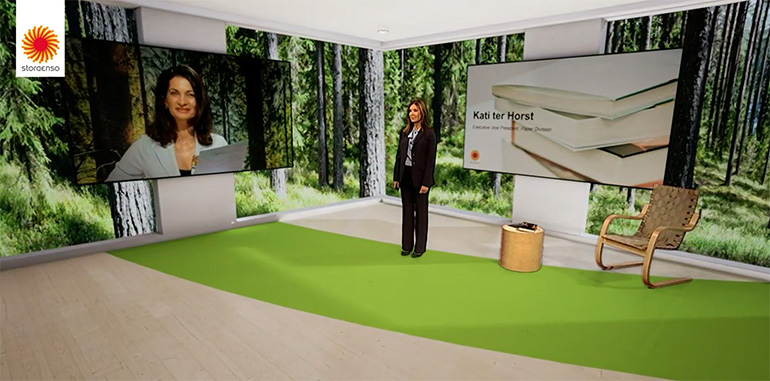In Finland, home to Europe’s biggest book lovers, at least a quarter of the population said they read more during the Covid-19 mandated shutdowns. Similarly, a survey in the UK revealed that two in five adults increased their reading habits while in lockdown. The average time used for reading even doubled.
In difficult times, people are turning to reading to increase their sense of security, says Henna Virkkunen, a Member of the European Parliament, who sees the growth as a sign of hope.
“Reading and books are at the core of prosperity to EU citizens,” she said when speaking as part of Stora Enso Paper division's Better Life with Books virtual event last week.
Towards a prosperous, sustainable future
Also central to the prosperity of EU citizens is the health of the environment – something that people around the world are paying especially close attention to today. Sustainability is foremost in the minds of many in Europe – European Union leaders and parliamentarians like Virkkunen included. There is much discussion and planning around how European Union can become climate neutral by 2050.
The circular economy is one means of accomplishing that, and the EU has created an action plan for industries looking to bring their processes more in line with these environmental goals. Between reducing waste, eliminating harmful pollutants and limiting the use of non-renewable resources, industries across the continent have to make changes to their production and supply chain processes that prioritise the health of the earth.
In many ways, the book publishing industry is already one step ahead of other industries.
“The circular economy already works very well in the forest and paper industry,” said Virkkunen, who noted that books are often shared or passed on to new owners before being recycled. Through sustainable product design and new printing processes, such as print-on-demand, the publishing industry can become even more sustainable.
Kati ter Horst, Executive Vice President at Stora Enso Division Paper, agrees with the sustainable nature of the book industry. “Basically, everything we do starts with the forest,” ter Horst said.
“We believe in responsible forest and plantation management. At Stora Enso, 100 per cent of our wood comes from sustainable sources.”
Sustainable sourcing is just one element that’s outlined in the European Green Deal’s action plan for creating a circular economy, one which aims to minimise waste and reuse resources.
“We reuse 98 per cent of the residuals from the paper-making process and 96 per cent of the water used is treated and released back into the local environment,” said ter Horst.
Along with these sustainable production processes, Stora Enso has invested in the creation of low-emission energy production for its own industry and other partners as well. In Belgium, for example, bio heating created by the run-off from the Stora Enso mill has led to a reduction in carbon emissions of 40 per cent for a nearby Volvo car factory.
Education as central to the European Green Deal
“Circularity is embedded in everything that we do,” said ter Horst.
That’s good news, as the importance of printed books only seems to continue to grow, even as digitalisation increases. “Over 90 per cent of children around the world experienced school closures due to the pandemic,” said Virkkunen. “And countries have responded differently and have different abilities to switch to online learning. Only 50 per cent of households have access to fast internet, and in some developing countries only 10 per cent.”
That’s where print books will continue to play a vital role. Reading provides children with lifelong skills and knowledge.
“The role of education and skills in research and innovation is very important,” Virkkunen said. “To be successful in the future and meet the needs of the Green Deal, we need to focus on education. And the book industry plays an important role in that.”
Better Life with Books virtual event








